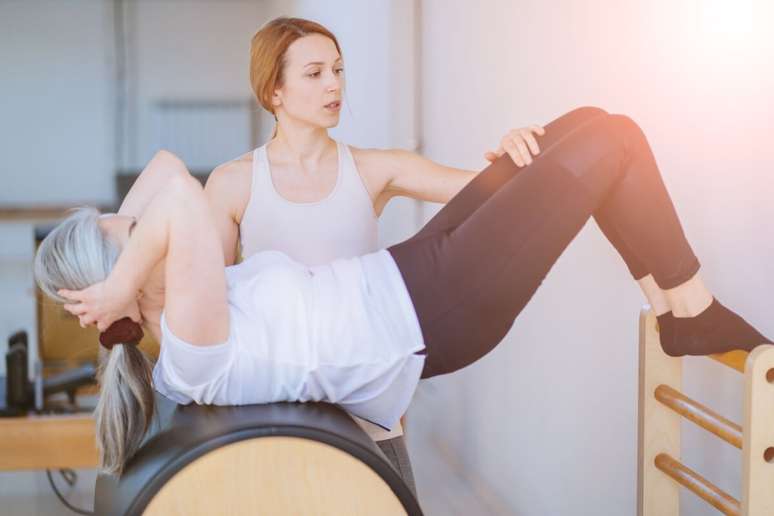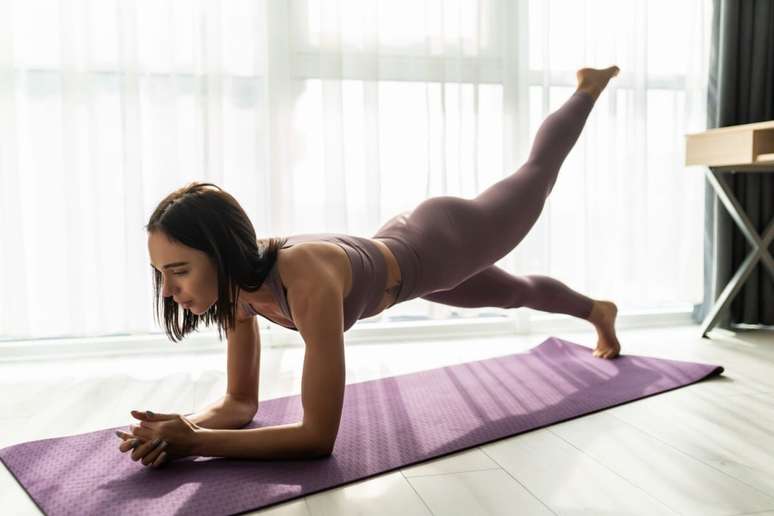Find out how this type of physical activity helps fight disease
Pilates is an excellent physical activity option for those who want to exercise both their body and mind. That’s because exercises focused on muscle strengthening and flexibility not only improve posture and relieve chronic pain, but also emphasize concentration, breathing control and body awareness, helping to reduce stress and anxiety.
Next, check out the 8 benefits of practicing Pilates for physical and mental health!
1. Improve your posture
Pilates exercises emphasize correct body alignment, promoting better and correct posture, both during training and in everyday life. This brings several benefits for those who carry out their daily activities most of the time sitting.
2. Relieves chronic pain
Pilates can help relieve chronic pain in some cases, especially in the back and joints, by strengthening the muscles that support these areas. “Pilates works to strengthen muscles, providing pain relief and improving joint stiffness. Over time, joints naturally tend to wear out, which can lead to pain and inflammation. The method requires good coordination, as well as stability and preparation to the overload that these provide repetitive movements. In this way, respiratory control, postural alignment and muscular rebalancing are promoted”, explains physiotherapist and teacher Josi Araujo, of Pure Pilates.
3. Benefits blood circulation
The movements of pilates help improve blood circulation. This is beneficial for cardiovascular health and tissue oxygenation, also because it increases energy levels throughout the day.
4. Strengthens muscles
Pilates exercises are designed to strengthen your core and stabilizer muscles, with particular attention to the core, legs and glutes. “The bodies trained with the method are strong, elongated, flexible and healthy. Posture improves greatly and movements become elegant, both on the tools and on the floor. The center of strength of Pilates, made up mainly of the abdominal muscles, is found in the lower back, hips and buttocks, is the basis of the technique developed by Joseph”, explains physiotherapist Dalmara Vendeiro.

5. Promotes coordination and balance
Regular Pilates practice helps neuromuscular coordination and balance, which is essential for preventing falls, especially among the elderly. “Exercises that work on body awareness are essential to help correct posture. This helps older adults better understand how their body moves and make adjustments to avoid harmful movements that could lead to falls,” explains Josi Araujo.
6. Helps with sleep quality
By acting on muscle relaxation and breathing control, Pilates also calms the mind. This prepares the body for a deeper, more peaceful and restful sleep.
7. Relieves stress and anxiety
Pilates exercises emphasize breathing control and concentration, helping to reduce stress, anxiety and promoting a greater connection between mind and body. “In Pilates we work a lot with breathing, posture, muscles and balance which, combined with the specific objectives of treating different mental illnesses, make the method extremely important for preventing and alleviating these illnesses,” explains Josi Araujo.
8. Improves breathing
This exercise practice focuses on strengthening your core muscles. Pilates emphasizes deep, controlled breathing, which helps strengthen the diaphragm, essential for breathing, and also improves lung function. “Through breathing, it helps to rebalance lung function, thoraco-abdominal mobility and increase lung volume,” says Josi Araujo.
Source: Terra
Ben Stock is a lifestyle journalist and author at Gossipify. He writes about topics such as health, wellness, travel, food and home decor. He provides practical advice and inspiration to improve well-being, keeps readers up to date with latest lifestyle news and trends, known for his engaging writing style, in-depth analysis and unique perspectives.









